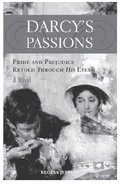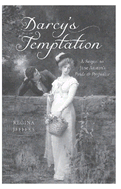Christmas at Pemberley (56 page)
Read Christmas at Pemberley Online
Authors: Regina Jeffers

After that, Darcy heard little of what remained of the service. His mind remained on the Madonna-like image of his wife and child. Yesterday, they had received a detailed letter from Mary Joseph describing the three-month-old William. Elizabeth had read it twice, and even he'd delighted in her oral recitation. Soon, she would mimic Mrs. Joseph's epistolary style and send volumes of newsy letters of their son's accomplishments: the boy's first tooth, first word, his first steps. Just as Mrs. Joseph had predicted, many momentous occasions would follow this day.
The most surprising part of Mary Joseph's letter wasn't the final passing of her husband's mother, but the news of Mary's reconciliation with her father, who was none other than Edgar Parnell.
“Did you know of Mrs. Joseph's connection to Parnell?” he had asked Elizabeth after reading the businessman's letter, in which Parnell had agreed to partner with Darcy in a shipping venture.
“Of course, I didn't know,” she had protested. Then Elizabeth smiled widely before saying,“If so, I might have withheld my services until the dear lady promised to speak to her father on your behalf.”
Darcy had laughed at her and then chased his wife about his study. It was the first time they had made love since she had
delivered their child some three-plus weeks prior. Afterwards, as they had lain, wrapped in each other's arms, on the animal rug before the hearth, he had nuzzled into her hair and whispered, “Thank you, Lizzy.You've given me a perfect world.”
delivered their child some three-plus weeks prior. Afterwards, as they had lain, wrapped in each other's arms, on the animal rug before the hearth, he had nuzzled into her hair and whispered, “Thank you, Lizzy.You've given me a perfect world.”
“My heart has been transformed by your love and by God's grace.”
Darcy had brushed the hair from her face. “Our last Christmas changed our lives. We befriended the Josephs and will be forever connected to them. Georgiana and Kitty have chosen men to complete them. Anne knows family, at last. You and my aunt have resolved your differences, and we've both come to know the grace of God in our child's face.”
Elizabeth kissed him briefly. “I had looked for God in all the wrong places. He's not found among the dead, not in the cemetery. I looked so hard for Godly things that I nearly missed God's grace when it presented itself. I've come to understand that a person needs God's love the most when he sees the need the least.”
“An infant is a speck of Heaven that God allows us to experience. I wish to fill this house with Heaven's smallest specks. Will you join me, Lizzy?”
“I can think of no better paradise on this earth. I love you, Fitzwilliam Darcyâwith all my heart.”
“And I love you, my dearest Elizabeth. Forever and ever.”
AFTERWORD

WHEN MOST PEOPLE CONSIDER a Regency Christmas, they are really envisioning a Victorian Christmas. The Regency Christmastide began with Christmas Day and ran through Twelfth Night. There are few references to Christmas celebrations in Regency literature other than the occasional wish for a “Happy Christmas” among story characters and real-life accounts.
English Christmases of the time were entrenched in religious observances. One must remember that in the 16th Century, to prevent subversion, the government banned Christmas celebrations. According to the
Jane Austen Centre Magazine
, “We have accounts from early 19th Century journals of Christmas days where the writer mentions the holiday but makes absolutely no fuss about it. Likewise, there are records of newspapers, published on December 25th that do not even contain the word
Christmas
.” (
http://www.janeausten.co.uk/magazine/index.ihtml?pid=387&step=4
; June 17, 2011).
Jane Austen Centre Magazine
, “We have accounts from early 19th Century journals of Christmas days where the writer mentions the holiday but makes absolutely no fuss about it. Likewise, there are records of newspapers, published on December 25th that do not even contain the word
Christmas
.” (
http://www.janeausten.co.uk/magazine/index.ihtml?pid=387&step=4
; June 17, 2011).
The gathering of greeneryârosemary, holly, laurel, and mistletoeâto decorate the household appears often in period literature. As for the mistletoe/kissing ball, it became quite elaborate during the Victorian Period. However, many believe the tradition remained below stairs in the servants' quarters during the Regency Period, but who is to say?
A Yule log to burn throughout the festive days would have been common, as well as the “Christmas candle.” Groups of performersâmummersâdate
back to the Middle Ages. They sang and performed short plays, and because of their lower class, they often mixed bits of history with the British Napoleonic heroes. Of course, Saint George remained a staple of these plays.
back to the Middle Ages. They sang and performed short plays, and because of their lower class, they often mixed bits of history with the British Napoleonic heroes. Of course, Saint George remained a staple of these plays.
Parlor games entertained houseguests, but there were no caroling or stockings or Christmas trees. Gifts were limited and often took the form of charitable acts by the aristocracy.
With all this in mind, in this story line, I tried to capture the “Christmas story's lesson,” without all the hoopla of which we nowadays partake. Plus, I took the liberty to add a bit of romance, hope, and intrigue.

In this tale, I have taken some factual liberties in Beauford Manneville's story. Here are the actual facts of Princess Charlotte's “indiscretions.” In the spring of 1812, George IV tried to pique his daughter's interest in William, Prince of Orangeâa move which would have strengthened England's alliance with the Netherlands. William had lived in exile in England and had even been educated in Oxfordshire. At first, Princess Charlotte refused the connection, but the Regent persisted, and at an arranged Carlton House dinner party on December 11, 1813, Charlotte accepted her father's wishes.
However, the Princess had second thoughts upon discovering that William would expect her to live half of the year in Holland. Part of the problem was that Charlotte feared her mother might follow her to Europe and then Prince George would use his wife's desertion as grounds for divorce. If so, the Regent would be free to remarry and possibly produce a male heir to the throne. Thus, Charlotte would lose her position as the future queen.
During this time, Mercer Elphinstone was Charlotte's chief confidante and aided the willful princess with her liaisons.
Charlotte's next
tendre
was for Prince Frederick, the King of Prussia's nephew. In Frederick's case, Miss Cornelia Knight, one of the princess's ladies in waiting, arranged several discreet meetings and acts of correspondence. Charlotte's relationship with Frederick ended in January 1815, when he returned her portrait and informed Charlotte that he had found another.
tendre
was for Prince Frederick, the King of Prussia's nephew. In Frederick's case, Miss Cornelia Knight, one of the princess's ladies in waiting, arranged several discreet meetings and acts of correspondence. Charlotte's relationship with Frederick ended in January 1815, when he returned her portrait and informed Charlotte that he had found another.
In July 1814, the Regent became “fed up” with his daughter's defiance, and he dismissed all her servants and her lady attendants. Charlotte sought protection with her mother Princess Caroline, but still being under the Prince's domain until age one and twenty, Charlotte was returned to Carlton House.
On Christmas Day 1814, Charlotte sought reconciliation with her father. In doing so, she admitted her recent relationship with Captain Hesse. Princess Caroline had encouraged the connection between her daughter and the captain, and Mercer Elphinstone had arranged the meetings and the correspondence between the lovers.
Charlotte had previously requested a return of her letters from Hesse, who had served as an equerry in Princess Caroline's service for a time. However, Hesse made no move to respond to Charlotte's demand, and the foolish princess had anticipated being blackmailed.
Over the next four days, Charlotte ingratiated herself with her father, and the Regent discovered details regarding his wife's duplicity. During those conversations, Charlotte admitted an interest in Prince Leopold, the third son of the Duke of Saxe-Coburg-Saalfeld, the man whom she would eventually marry.
Â
Those are the facts. This is the fiction: Beauford Manneville was
not
Captain Hesse's American relative, and Hesse
did not
send Princess Charlotte's letters and personal items to Manneville for safekeeping. Manneville is a plot device and a pure creation of my imagination. He is used to add a “what if ” to the story.
not
Captain Hesse's American relative, and Hesse
did not
send Princess Charlotte's letters and personal items to Manneville for safekeeping. Manneville is a plot device and a pure creation of my imagination. He is used to add a “what if ” to the story.
OTHER ULYSSES PRESS BOOKS

Darcy's Passions: Pride and Prejudice Retold Through His Eyes
Regina Jeffers, $14.95
This novel captures the style and humor of Jane Austen's novel while turning the entire story upside down. It presents Darcy as a man in turmoil. His duty to his family and estate demand he choose a woman of high social standing. But what his mind tells him to do and what his heart knows to be true are two different things. After rejecting Elizabeth, he soon discovers he's in love with her. But the independent Elizabeth rejects his marriage proposal. Devastated, he must search his soul and transform himself into the man she can love and respect.

Darcy's Temptation: A Sequel to Jane Austen's Pride & Prejudice
Regina Jeffers, $14.95
By changing the narrator to Mr. Darcy,
Darcy's Temptation
presents new plot twists and fresh insights into the characters' personalities and motivations. Four months into the new marriage, all seems well when Elizabeth discovers she's pregnant. However, a family conflict that requires Darcy's personal attention arises because of Georgiana's involvement with an activist abolitionist. On his return journey from a meeting to address this issue, a much greater danger arises. Darcy is attacked on the road and, when left helpless from his injuries, he finds himself in the care of another woman.
Darcy's Temptation
presents new plot twists and fresh insights into the characters' personalities and motivations. Four months into the new marriage, all seems well when Elizabeth discovers she's pregnant. However, a family conflict that requires Darcy's personal attention arises because of Georgiana's involvement with an activist abolitionist. On his return journey from a meeting to address this issue, a much greater danger arises. Darcy is attacked on the road and, when left helpless from his injuries, he finds himself in the care of another woman.

Other books
Black Hills Bride by Deb Kastner
Symptoms of Death (Dr. Alexandra Gladstone Book 1) by Paula Paul
A Bid For Love by Michelle Houston
Ghost Talker by Robin D. Owens
Bride of a Distant Isle by Sandra Byrd
Isabella Moon by Laura Benedict
Out of the Blue by Helen Dunmore
With His Love (For His Pleasure, Book 16) by Favor, Kelly
Negative by Viola Grace
The Chasing Diaries (A Chasing Series Companion Novella) by Ann, Pamela
